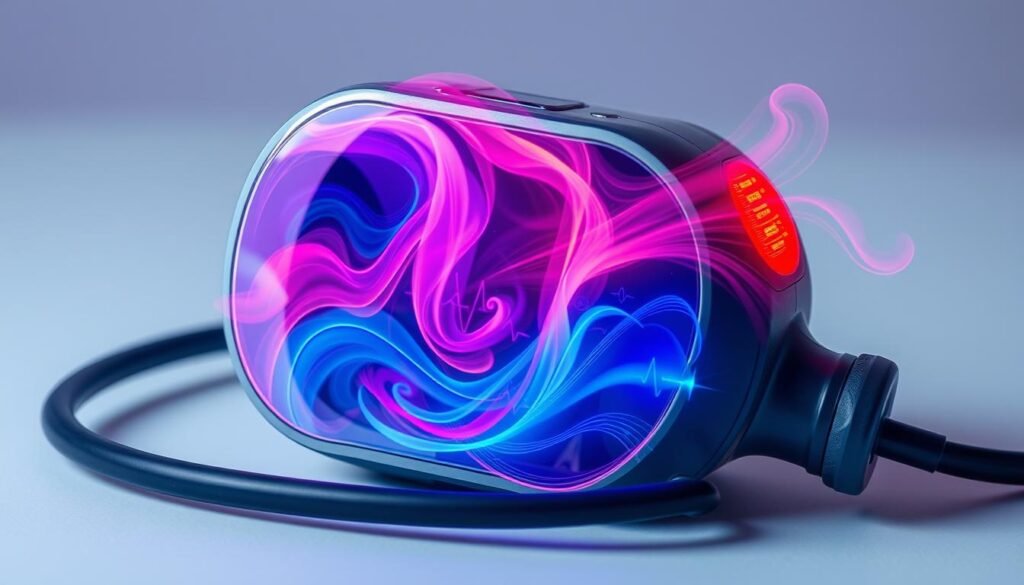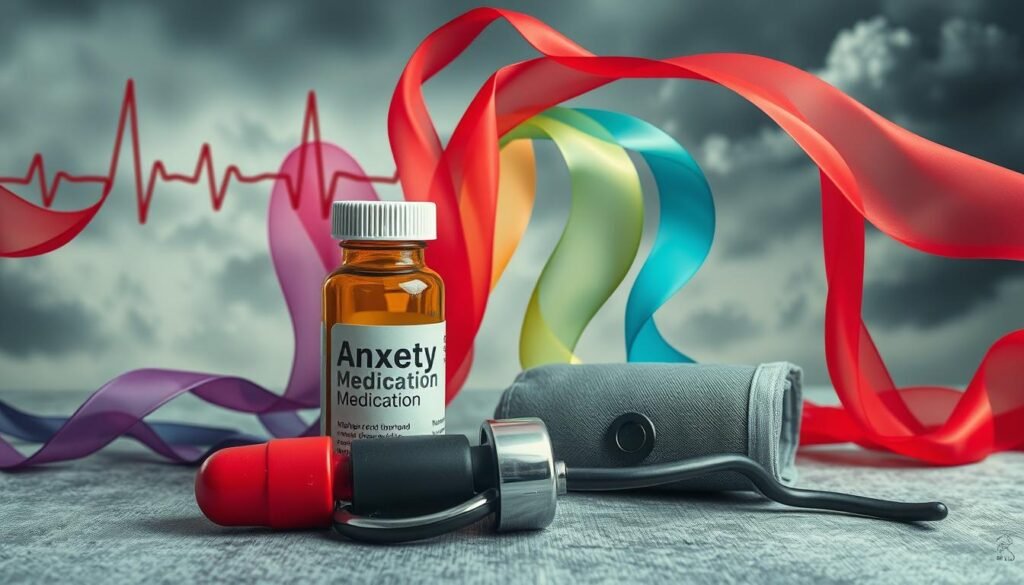Over 40 million adults in the United States face anxiety disorders yearly, affecting their physical health. A major issue is how anxiety relates to blood pressure. Research shows anxious individuals might have a higher chance of getting hypertension, which can harm heart health. It’s essential to know if anxiety can increase blood pressure for better mental and physical health management.
Now, high blood pressure is considered anything over 130/80. People must understand how anxiety can change blood pressure. This article will explore the link between anxiety and high blood pressure. We will look at how mental health affects blood pressure and ways to handle it well.
Key Takeaways
- Over 40 million adults in the U.S. are affected by anxiety disorders annually.
- Anxiety can lead to temporary spikes in blood pressure, affecting cardiovascular health.
- Guidelines indicate that high blood pressure is now defined as over 130/80.
- People with anxiety disorders may also be at a greater risk of developing hypertension.
- Regular monitoring of blood pressure is crucial, especially for those with anxiety.
- Lifestyle changes and therapies can help manage anxiety and potentially lower blood pressure.
- Understanding the mind-body connection is key to improving overall health.
Understanding Blood Pressure and Hypertension
Blood pressure is the force that blood puts on vessel walls. It is measured with two main numbers: systolic and diastolic pressure. Systolic pressure happens when the heart beats. It’s the first number. Diastolic pressure, the second number, occurs when the heart rests between beats. These numbers help us know about our heart health.
Hypertension, or high blood pressure, comes in two kinds. One is essential hypertension, which has no clear cause. The other is secondary hypertension, which has a specific cause. The American Heart Association says almost half of U.S. adults have high blood pressure. This means their pressure is at or above 130/80 mmHg. A normal blood pressure is under 120/80 mmHg. Stage 1 hypertension starts from 130-139 systolic or 80-89 diastolic.
Anxiety and high blood pressure affect each other a lot. People with high blood pressure often feel more anxious. Anxiety can make blood pressure jump up quickly. But, it doesn’t usually cause long-term high blood pressure. Long-lasting anxiety, like in certain disorders, could make blood pressure stay high over time.
Being anxious can lead to unhealthy habits. These can raise blood pressure. Such habits include smoking or eating poorly. People with anxiety may also not exercise much. So, they might not control their blood pressure well. Getting help for anxiety and depression can help people with heart disease too. This shows it’s vital to take care of both your mind and body.
| Blood Pressure Level | Systolic (mm Hg) | Diastolic (mm Hg) |
|---|---|---|
| Normal | Below 120 | Below 80 |
| Elevated | 120-129 | Below 80 |
| Hypertension Stage 1 | 130-139 | 80-89 |
| Hypertension Stage 2 | 140 or higher | 90 or higher |
| Hypertensive Crisis | Higher than 180 | Higher than 120 |
What is Anxiety and Its Types?
Anxiety is a big mental health issue, marked by too much worry or fear. It shows up in different forms, each known as a type of anxiety. Generalized anxiety disorder and social anxiety disorder are especially common, affecting many aspects of life.
Generalized anxiety disorder (GAD) is when you’re always anxious about many things like work or health. People with GAD worry a lot, even when there’s no big reason to. This worry can make it hard to focus and affect your body, hurting your health.
Social anxiety disorder (SAD) is about fearing and feeling uneasy in social situations. Those with SAD may stay away from these situations to avoid feeling judged or embarrassed. This fear can make it hard to do normal day-to-day activities.
It’s important to know the differences between anxiety types. Each affects your health, especially your blood pressure, in its way. Knowing about GAD and SAD can help find the right treatment for each person.
| Type of Anxiety | Description | Common Symptoms |
|---|---|---|
| Generalized Anxiety Disorder | Chronic anxiety about multiple aspects of life. | Excessive worry, restlessness, fatigue, difficulty concentrating. |
| Social Anxiety Disorder | Intense fear of social interactions. | Fear of negative evaluation, avoidance of social situations, sweating, trembling. |
| Panic Disorder | Recurring panic attacks. | Heart palpitations, shortness of breath, dizziness, feeling of losing control. |
Understanding these anxiety types helps us see how they affect our mental and physical health. They can influence blood pressure and heart health. Knowing this helps in managing these conditions better.
Can Anxiety Raise Blood Pressure?
Anxiety affects blood pressure in many ways. Stressful events can make blood pressure rise temporarily. This shows that anxiety can increase blood pressure, especially in acute episodes. These short-term effects might include a fast heart rate, raising concerns about heart health. It’s important to know how these spikes happen to manage anxiety and heart well-being.
Temporary vs. Chronic Anxiety Effects
Temporary anxiety can cause brief spikes in blood pressure. These increases don’t last long, but repeated ones could risk long-term heart health. Chronic anxiety leads to lasting high blood pressure, harming blood vessels and organs. For those with anxiety disorders, dealing with heart issues becomes even more crucial.
Anxiety Disorders and Their Impact on Cardiovascular Health
People with anxiety disorders face a greater chance of high blood pressure. The stress from anxiety can lead to bad habits like smoking or overeating, worsening blood pressure issues. Knowing what triggers anxiety and changing lifestyles can reduce these dangers. Treatments like cognitive behavioral therapy help manage anxiety and blood pressure. For more information on anxiety and its impacts, click here.
The Connection Between Stress and High Blood Pressure
Stress and high blood pressure are closely linked. Chronic stress can lead to unhealthy habits such as overeating, smoking, and drinking too much. These behaviors can make high blood pressure worse. It’s important to understand how they connect to take care of your heart.
Common Lifestyle Factors Affecting Blood Pressure
Lifestyle changes can really improve your health. By adjusting a few habits, you can make a big difference. These include:
- Exercising 3 to 5 times a week for at least 30 minutes to lower stress levels.
- Limiting alcohol and caffeine intake, as both can lead to higher blood pressure.
- Maintaining a balanced diet while avoiding overeating, as unhealthy eating habits contribute to hypertension.
- Building and nurturing social connections to reduce feelings of anxiety, depression, and social isolation.
Noticing behaviors connected to high blood pressure and heart disease is key to better health. Stress can temporarily raise blood pressure, which might cause heart attacks or strokes. Long-term high blood pressure can harm the heart, blood vessels, and kidneys.
Handling stress well can lead to a healthier lifestyle and lower blood pressure. Effective stress management includes:
- Regular physical activity.
- Practicing yoga and meditation for relaxation.
- Ensuring at least 7 hours of sleep each night.
- Shifting perspectives on challenges to reduce stress levels.
By managing stress and understanding its impact, you can live a healthier life and manage your blood pressure better.

Panic Attacks and Their Relation to Hypertension
Panic attacks are intense fear episodes that trigger physical responses. These include a spike in blood pressure and heart rate. This can make people rush for emergency help, starting a cycle of more anxiety and high blood pressure.
Immediate Effects of Panic Attacks on Blood Pressure
When you have a panic attack, your body’s fight-or-flight response is activated. This releases stress hormones, increasing heart rate and blood pressure quickly. Studies show these attacks can make blood pressure go up throughout the day. If not treated, these surges can lead to long-term high blood pressure. Around half of U.S. adults deal with hypertension, so managing panic attacks is key.
A study in 2010 found people with panic disorder had higher blood pressure than those without it. This means regular panic attacks can really push up your blood pressure over time. Treating anxiety can involve medications or therapy. Both can lower the frequency and intensity of panic attacks. Managing anxiety well is important for both mental and heart health.
If panic attacks are a common problem for you, it’s best to get professional help. Treatment can reduce emergency visits for panic and heart issues. To learn more about anxiety and blood pressure, check out this link.
How Mental Health Influences Blood Pressure
Mental well-being greatly impacts our body, especially in regulating blood pressure. Factors like anxiety, depression, and stress are key in hypertension development. Studies show a link between anxiety disorders and a higher chance of hypertension, marked by a pooled odds ratio of 1.18.
In the U.S., almost half the adults have high blood pressure. This condition is increasingly tied to anxiety and stress. Research shows people with anxiety have a higher risk of hypertension over time. This points out why mental health is crucial in blood pressure control.

Chronic anxiety can cause blood pressure to fluctuate. Short-term worries may briefly raise blood pressure, but ongoing stress can lead to lasting issues. Taking self-assessment quizzes can spot anxiety disorders early. This allows for timely intervention to prevent hypertension.
It’s vital to understand how mental health and blood pressure connect. Knowing this, people can aim for a healthier lifestyle. This approach can reduce mental health problems and blood pressure alike.
Anxiety Management and Its Role in Blood Pressure Control
Managing anxiety well can help control your blood pressure. There are many ways to ease anxiety, which can lower blood pressure effects. Using natural remedies and changing your lifestyle can boost your health a lot.
Natural and Lifestyle Remedies for Managing Anxiety
Making better lifestyle choices can cut down anxiety and help with blood pressure. Here are some methods to try:
- Regular Exercise: Working out releases endorphins, which make you feel better and stress less.
- Meditation and Mindfulness: Yoga and deep breathing exercises can reduce your anxiety.
- Dietary Changes: Eating lots of fruits, vegetables, and grains is great for your mind.
- Supplements: Anxiety can be eased with natural options like magnesium and ashwagandha, boosting wellness.
Using these methods together can tackle anxiety and blood pressure effectively.
The Importance of Regular Monitoring
Keeping a close watch on your blood pressure is key. It shows when levels might be going up due to stress. Watching your blood pressure helps you see how stress affects your body.
Doing regular checks means you can adjust your treatment or habits as needed. This is very important for people with high blood pressure or anxiety issues. Without care, these problems could get much worse.
| Remedy | Description | Benefits |
|---|---|---|
| Regular Exercise | Physical activity, including aerobic exercises and strength training. | Reduces anxiety, boosts mood, and lowers blood pressure. |
| Meditation | Mindfulness meditation, guided imagery, and yoga practices. | Enhances relaxation, increases focus, and reduces blood pressure spikes. |
| Diet | A diet rich in omega-3 fatty acids, whole grains, and antioxidants. | Improves overall mental health and supports cardiovascular health. |
| Supplements | Natural supplements such as magnesium and ashwagandha. | May help alleviate anxiety symptoms and potentially aid blood pressure management. |
Medication Effects: How Treatment for Anxiety Affects Blood Pressure
It’s important to know how anxiety medication affects blood pressure for those being treated. Different anxiety medications can change blood pressure in various ways. Patients should discuss these effects with their doctors.
SSRIs are often used for anxiety and don’t usually cause high blood pressure. However, SNRIs might lead to short-term high blood pressure but don’t often require constant checks.

Stimulant medicines, like those for ADHD, can make you feel more anxious and restless. They can do this especially if you take a lot. Medicines with caffeine can also make your heart rate and blood pressure go up.
- Beta blockers can help with both high blood pressure and anxiety, often lowering blood pressure.
- Mood disorder meds, for things like depression, might make anxiety worse and affect blood pressure.
- Drugs like Albuterol and Salmeterol for breathing problems can cause anxiety feelings and physical symptoms like shaking.
It’s vital for patients to talk openly about their anxiety meds and any changes in blood pressure. Managing both well can really help improve health. For more information on anxiety and high blood pressure, visit this resource.
Knowing how treatment for hypertension could come from medicine-induced anxiety is key. This understanding allows patients to look for the best treatment options for their health.
Emotional Influence on Blood Pressure: The Mind-Body Connection
Emotions and blood pressure are closely linked. Feeling stressed, anxious, or down can make your blood pressure go up. Over time, dealing with a lot of stress or facing discrimination can lead to high blood pressure.
Work stress is a big factor too. Jobs that demand a lot but give you little control can increase your blood pressure. This problem doesn’t just stay at work; it follows you home, affecting your overall health. The job strain model shows how work stress impacts us.
Our social life affects blood pressure as well. Being alone too much can slow down recovery from stress. On the flip side, having a strong, happy marriage can be good for your health. But, troubled relationships can make your blood pressure spike.
Where you stand in society can influence your blood pressure. Lower income and less education can increase your risk for heart problems. Stress can seriously harm your heart by raising your blood pressure.
It’s important to take care of your mental health. Anxiety and depression can make it hard to live a healthy lifestyle, which can affect blood pressure control. Mindful practices like meditation and exercise can help both your mind and heart.
| Psychosocial Factor | Impact on Blood Pressure |
|---|---|
| Chronic Stress | Elevated BP and increased hypertension risk |
| Job Strain | Higher ambulatory BP at work and home |
| Social Isolation | Delayed post-stress BP recovery |
| Marriage Quality | Influences on overall health outcomes |
| SOCIOECONOMIC STATUS | Correlates with risk of hypertension |
The mind and body are connected in managing blood pressure. Knowing how emotions affect blood pressure can help us find ways to stay healthy in mind and heart.
Conclusion
Anxiety doesn’t directly cause long-term high blood pressure, but it does affect it during stress. In the U.S., around 19.1% of adults face anxiety disorders yearly. These situations trigger the fight-or-flight response, increasing adrenaline and cortisol levels. These changes harm heart health over time. So, strategies for managing anxiety blood pressure are key.
Taking care of your mental and physical health together is important. Making life changes helps control anxiety and keep blood pressure healthy. This includes regular exercise, staying mindful, eating well, and managing stress. Also, treatments like Cognitive Behavioral Therapy (CBT) and certain medications improve overall well-being.
It’s vital to be proactive about your health. Seek medical advice early for anxiety and high blood pressure issues. Using technology, such as remote patient monitoring by DrKumo, can help. It allows for immediate monitoring and support. Making lifestyle changes and getting therapy can greatly better your life and lower the risks from anxiety and high blood pressure.